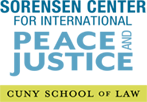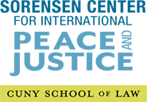In Virtual Action: Wolfgang Kaleck and the Sorensen Center
Date: September 2, 2021
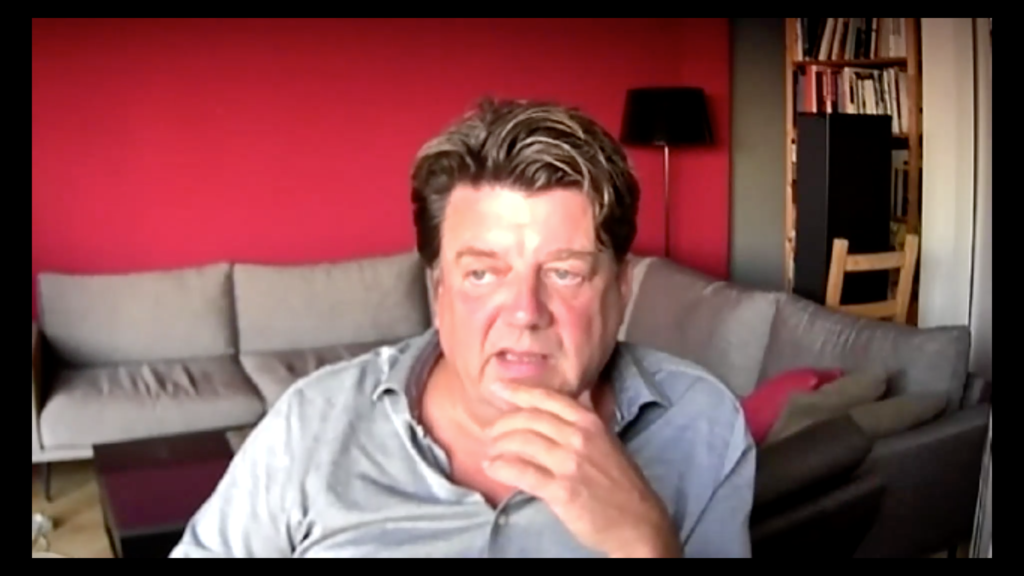
As CUNY School of Law students begin a new academic year, they will have ample opportunities to engage with the Sorensen Center for International Peace and Justice’s Scholar-in-Residence Wolfgang Kaleck. “In-residence” has taken on new meaning during the pandemic. While Kaleck is currently in Berlin, Germany, where he serves as Founder and Secretary-General of the European Center for Constitutional and Human Rights (ECCHR), he remains a regular in our virtual Sorensen Center.
Shortly after Kaleck arrived in New York City in early 2020 to begin his tenure at the Sorensen Center, COVID-19 was declared a global pandemic. On the eve of CUNY Law’s building closure, Kaleck spoke to our community about the power of social movements and impunity. The following week, the Center had planned an event on universal jurisdiction with Kaleck and other ECCHR lawyers who represented survivors of torture and sexual violence perpetrated by state officials in the first trial worldwide on torture in Syria. ECCHR’s work on the al-Khatib trials is part of a series of criminal complaints on torture and sexual violence that ECCHR and approximately 100 Syrians filed in Germany, Austria, Sweden, and Norway beginning in 2016.
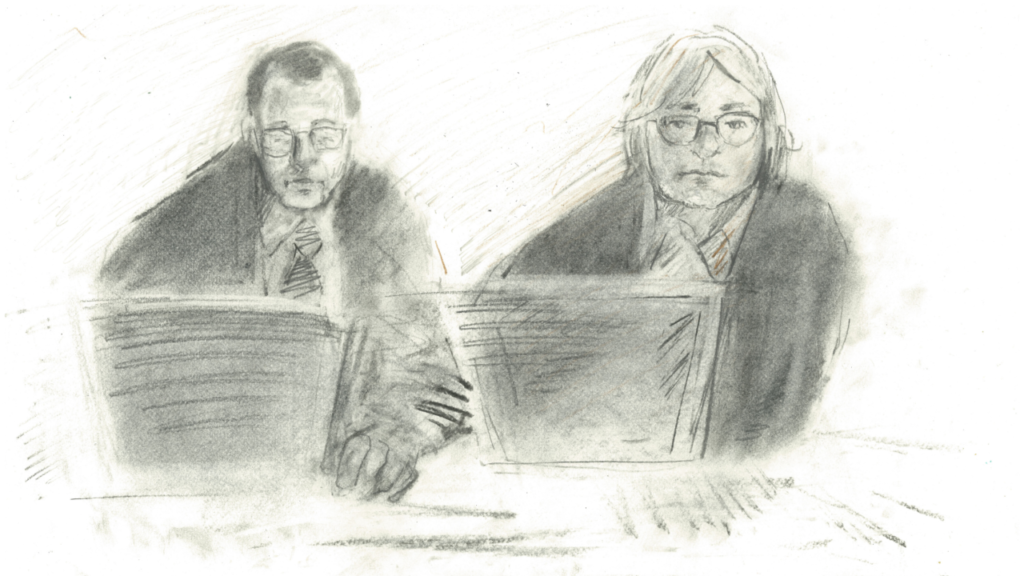
Judges at the Koblenz Higher Regional Court | Image: Naser Husein via ecchr.eu
It was the announcement of that last in-person talk with Kaleck in March 2020, that remained on all of the electronic screens at CUNY Law long after the building was closed. Later, in February 2021, Kaleck shared from Koblenz, Germany that the German Court sentenced the defendant of crimes against humanity, highlighting the torture and sexual violence committed by Bashar al-Assad’s government and Syrian intelligence services. It was the first time a former member of the Syrian intelligence was convicted of a crime under international law. Commenting on strategic litigation in a feature story in The New Republic, Kaleck said the term is too broad, signifying some grand design, when so much of what makes or breaks these cases is chance. “Strategic and opportunistic have to go together,” Kaleck says, “You develop certain strategies over years, you lay the basis, and then you have to seize opportunities.”
Since Kaleck’s departure from New York, our community has continued to learn from his virtual engagements. At the start of last academic year, the Center’s “Critical Voices: From Local to Global” speaker series featured Kaleck with his client, Edward Snowden, for a conversation about surveillance, privacy, and civil liberties. Yulia Marshak ‘23 said, ““It was surreal to have this opportunity to hear Edward Snowden speak with such detail and eloquence on this multifaceted topic.” Marshak went on to focus on similar issues of global digital rights and privacy as a 2021 Sorensen Center Fellow interning with Access Now.
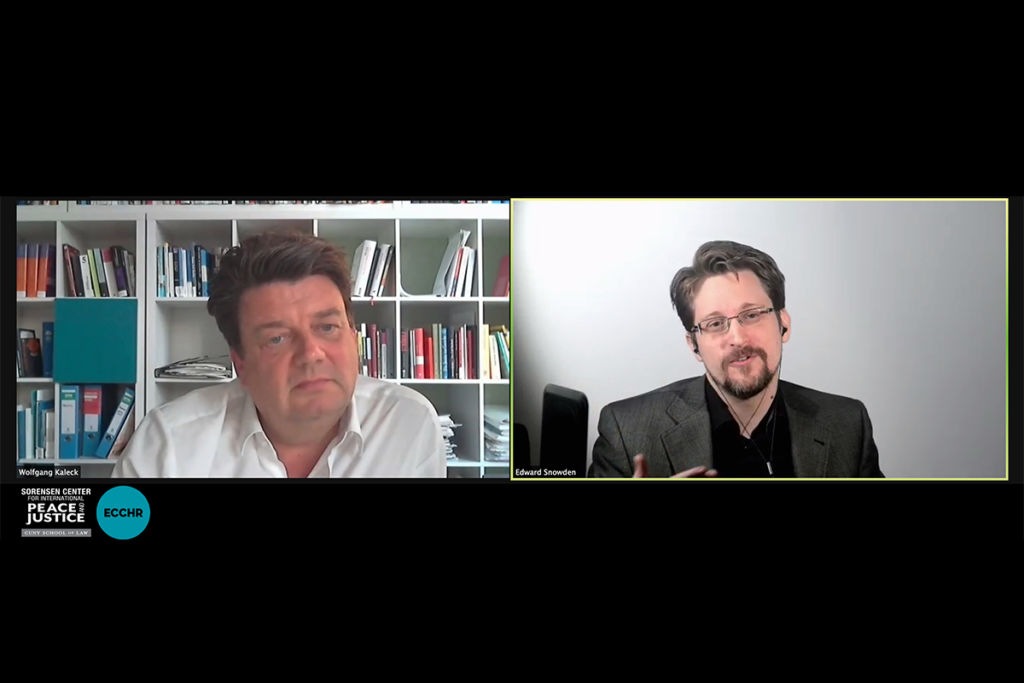
Wolfgang Kaleck and Edward Snowden at a virtual Sorensen Center “Critical Voices” discussion
The pandemic also offered a rare window for Kaleck to write. He recently completed his fourth book The Concrete Utopia of Human Rights: A Look Back into the Future, which has been published in German under the title Die konkrete Utopie der Menschenrechte. Ein Blick zurück in die Zukunft. Kaleck’s discussions and earlier books showed Sorensen Center Fellows and other CUNY Law students how one international lawyer can work closely with communities to address injustices committed by powerful players who too often enjoyed impunity. In The New Republic’s feature, the Sorensen Center’s Founding Executive Director Camille Massey ‘95 said this is what she intended when inviting Kaleck to be a Scholar at the Center, “What makes Wolfgang successful is that he is able to understand both the power and the limitation of law.… His work shows that there’s room for activism within human rights law.” Kaleck virtually returned to the Sorensen Center on September 1st to provide a sneak preview of his new book before it is published in English. He discussed concepts about how to advance human rights during times of crises we are living through today. A recording of the program is available for free viewing on YouTube.
Thanks to the generosity of numerous Sorensen Center donors, CUNY Law students have interacted with many global leaders, including Kenyan lawyer Maina Kiai, Justice Richard Goldstone, Judge Rosemary Barkett, Justice Albie Sachs, Senator George Mitchell, and former U.N. Secretary-General Kofi Annan. Students also have opportunities to embark on their own international justice work at home, around the country, and globally. “The Sorensen Center is an ambitious startup,” said Massey. “We’re building a center to train social justice lawyers who will help our local communities in NYC as well as connected communities around the world. Together, we have much to do and learn.”
In a recent note to Sorensen Center Fellows, Kaleck wrote, “I am hoping for you and for myself that at some point later in 2021 or 2022 we can meet in person – because legal and political work requires personal and emotional relations as well as the presence of the people in the universities, in the courts and in the streets.” Wolfgang, we agree and look forward to your return!
